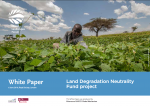 6 June 2016: As part of its efforts to promote actions to avert and combat land degradation, the Global Mechanism of the UN Convention to Combat Desertification (UNCCD) has proposed the creation of an independent public-private partnership investment fund, known as the Land Degradation Neutrality (LDN) Fund. In order to explore the Fund’s feasibility, the Global Mechanism and Mirova, a structuring partner and potential manager of the Fund, published a market study, titled ‘Unlocking the Market for Land Degradation Neutrality,’ which was launched 6 June 2016 in concert with a Global Landscapes Forum event at the Royal Society, London, UK.
6 June 2016: As part of its efforts to promote actions to avert and combat land degradation, the Global Mechanism of the UN Convention to Combat Desertification (UNCCD) has proposed the creation of an independent public-private partnership investment fund, known as the Land Degradation Neutrality (LDN) Fund. In order to explore the Fund’s feasibility, the Global Mechanism and Mirova, a structuring partner and potential manager of the Fund, published a market study, titled ‘Unlocking the Market for Land Degradation Neutrality,’ which was launched 6 June 2016 in concert with a Global Landscapes Forum event at the Royal Society, London, UK.
The market study aims to improve understanding of the dynamics of land degradation as an emerging “market,” with the potential to connect natural capital and landscape investments with public and private conservation finance. It also seeks to provide insights into existing market actors that are currently working on initiatives to combat land degradation and outline the key opportunities and gaps in the nascent LDN market.
Some salient findings of the report include: an estimated 25% of land worldwide is currently affected by degradation; there are commitments to restore land and prevent land degradation in more than 100 countries; and US$7 billion has been raised so far by “pioneering investment managers and project developers” for sustainable land use and land degradation rehabilitation projects worldwide.
A ‘White Paper’ produced by the two partners for the London launch relays the case for impact investment focused on combating land degradation. It notes that pressure on land “has reached such a critical point that serious doubts have been raised as to the capacity of land to meet the demands of a growing population.” Among some of the consequences on societies and economies, the paper highlights increased food insecurity, carbon emissions, biodiversity loss and pests, along with reduced availability of clean water and increased vulnerability of affected areas and their populations to climate change. Against this backdrop, the paper notes, building a LDN market offers a way to attract private capital to combat land degradation and help to achieve multiple environmental, social and financial benefits.
During the launch event, Markus Repnik, Managing Director of the Global Mechanism, stated that the work done by pioneer investment managers had “paved the way for a new investment territory that now needs to be further supported by a public-private fund – the LDN Fund.”
Mirova CEO Philippe Zaouati, said his company was “excited” to take up the challenge of moving into “this new frontier” of impact investment, noting it builds on international experience in developing similar dedicated funds that started 15 years ago with the first renewable energy funds, followed by carbon and green bond funds. He stressed that there is a critical and catalytic role for a public-private fund to play that would help a new asset class emerge and structure.”
Concluding that the investment case for the LDN Fund is “clear,” the market study discusses how the Fund can be used to unleash catalytic capital by putting in place different investment strategies and playing a pivotal role in complementing existing funding sources and channeling further capital into the sector. [Global Mechanism Press Release] [Unlocking the Market for Land Degradation Neutrality] [Land Degradation Neutrality Fund project (White Paper)] [Global Mechanism Webpage on LDN action] [UNCCD Website]